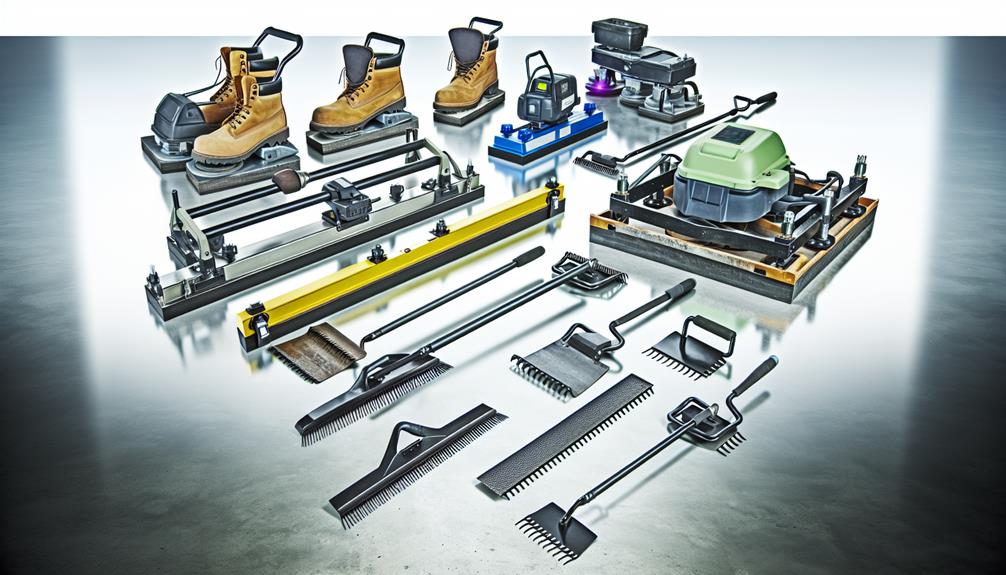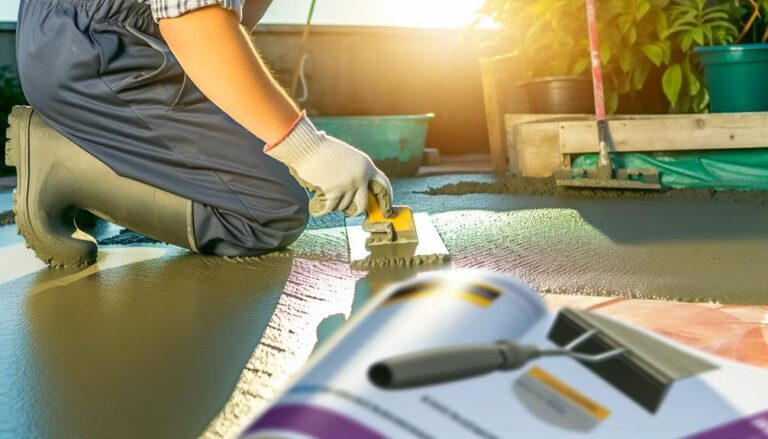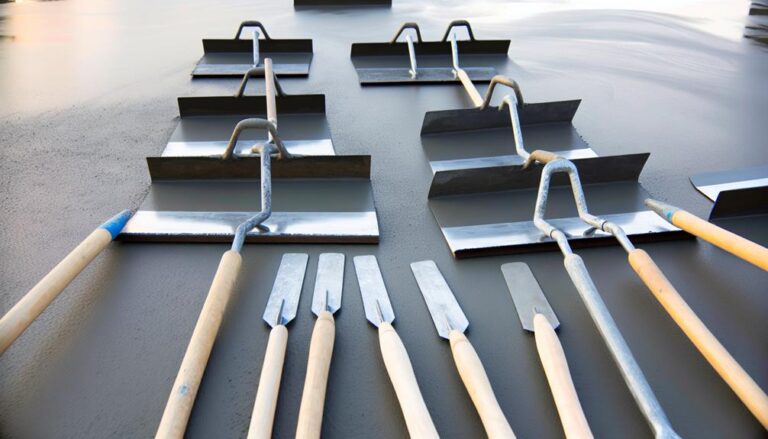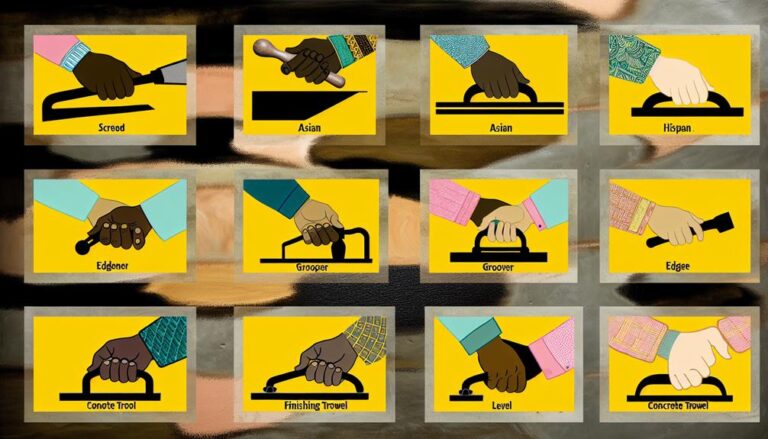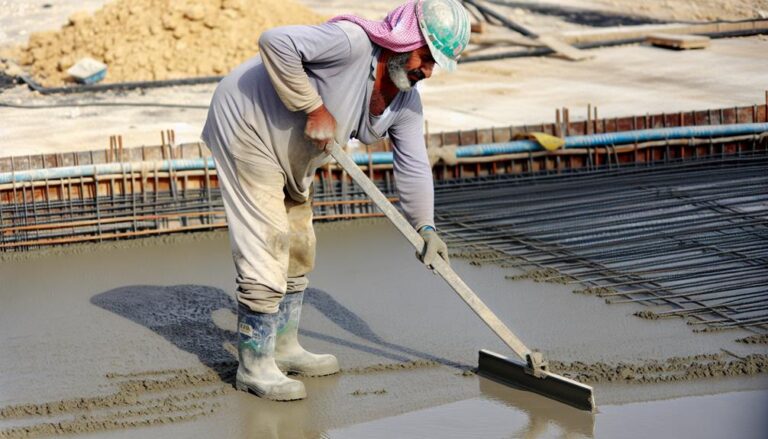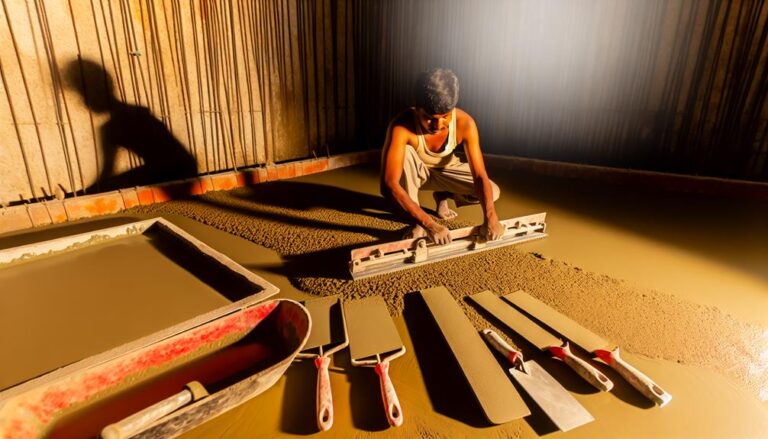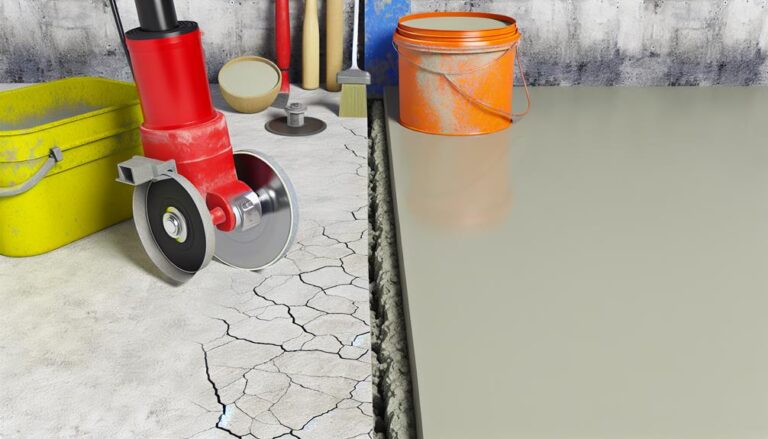5 Best Equipment Pieces for Concrete Leveling
For professional concrete leveling, you'll need some key equipment. A laser level provides precision and accuracy, ensuring a consistent, even surface. Next, a high-quality concrete mixer is essential to create a uniform mix. A power trowel will help you achieve that smooth finish you're aiming for. Then, screed boards are indispensable to remove excess concrete and level the surface. Finally, a drill for creating injection holes can't be missed. Ready to turn your concrete works into masterpieces? Get your hands on these tools and pretty soon, you'll get the hang of advanced leveling techniques.
Understanding Concrete Leveling Process
To fully utilize concrete leveling equipment, you need to first grasp the process of concrete leveling itself. It's not a complex procedure, but it's critical to ensure a smooth, even surface. The procedure begins with a careful evaluation of the area that needs leveling. You'll then drill small holes into the concrete, usually about 1 inch in diameter.
After the evaluation and drilling, you'll inject a mixture, often made of cement and soil, into the holes. This mixture, also known as slurry, fills the voids underneath the concrete slab, causing it to rise to the desired level. As the slurry hardens, it creates a stable base to support the concrete.
The final step is patching the drilled holes to blend them with the rest of the surface. You see, it's a simple yet crucial process that requires precision and the right equipment. Understanding these steps will enable you to better use your concrete leveling equipment, ensuring that you achieve the best results.
Laser Level: Precision Tool
Among the essential tools for concrete leveling, the laser level stands out, offering unparalleled precision and accuracy. This high-tech tool is your best friend when it comes to precision leveling, ensuring you get the job done right.
The laser level operates by projecting a beam of light that aligns perfectly with the horizontal or vertical axis. It's a tool that offers benefits you can't ignore:
- Ease of use: Laser levels are simple to operate. You're able to get accurate measurements without the need for complicated calculations.
- Efficiency: They save you time by giving instant readings. You'll reduce the number of errors and subsequent reworks.
- Versatility: These tools aren't just for concrete leveling. You'll find them handy in any construction project that requires precision.
- Durability: Modern laser levels are robust and designed to withstand the harsh conditions of a construction site.
- Cost-effective: While they might seem pricey initially, you'll save in the long run by reducing errors and waste.
Don't overlook the laser level. It's an investment in accuracy and efficiency, and a tool you'll come to rely on for all your leveling needs.
Concrete Mixer: Quality Assurance
Just as you rely on a laser level for precision, a concrete mixer is another tool that plays a key role in ensuring the quality of your concrete leveling work. A good mixer ensures consistency, a critical element in creating a level surface.
Consider the mixer's capacity and power when choosing one. You'll need a mixer that can handle the volume of concrete you're working with, and powerful enough to keep it churning smoothly. A mixer that's too small or lacks power could lead to uneven mixing, compromising the quality of your work.
Your mixer's drum should be easy to clean, as leftover concrete can harden and affect future mixes. Likewise, the mixing blades should be sturdy and durable, as they'll be subjected to a lot of wear and tear.
You might be tempted to skimp on the mixer to save some money, but remember that the quality of your work is at stake. A good concrete mixer is an investment in quality assurance. It's a tool that'll help you produce work you can be proud of and stand the test of time.
Power Trowel: Smooth Finishes
In concrete leveling, a power trowel is your go-to tool for creating a smooth, flawless finish. You'll find that it's an essential piece of equipment in your arsenal, especially when you're aiming for a polished surface. This machine uses multiple blades, spinning at high speeds to smooth out the concrete, eliminating any bumps or irregularities.
Here are a few things to consider when using a power trowel:
- Understanding your tool: Knowing how to operate your power trowel is crucial. It's not a one-size-fits-all scenario – you've got to adjust the speed and angle of the blades based on the concrete's condition.
- Safety first: Power trowels can be dangerous if not handled properly. Always use protective gear and follow safety guidelines.
- Regular maintenance: Keeping your power trowel in good shape is a must. Regular maintenance helps prolong its lifespan.
- Choosing the right blades: Different projects may require different types of blades. Do your research and choose wisely.
- Patience: It's a time-consuming process, yes. But rushing it won't help. Be patient and let the machine do its work for the best results.
Screed Boards: Perfect Flatness
After you've smoothed the concrete with a power trowel, it's time to bring in the screed boards to achieve perfect flatness. These tools are essential in the concrete leveling process. They're used to remove excess concrete and level the surface, ensuring your final product is flat and uniform.
Screed boards come in various sizes, giving you the flexibility to work on different projects. Larger boards are great for extensive areas, while smaller ones are perfect for tight spaces or detailed work. It's crucial to choose the right size to ensure accuracy and efficiency.
The traditional screed board is a simple, straight piece of lumber. However, technology has brought improvements to this essential tool. You can now find aluminum screed boards that are lightweight and easy to handle, yet sturdy enough for heavy-duty tasks.
Using a screed board isn't rocket science. You just need to drag it across the wet concrete surface with a sawing motion. This process helps to push down high spots and fill in low areas, creating a beautifully flat surface. Remember, achieving that perfect flatness requires patience and precision. So, take your time and do it right. You'll be rewarded with a professional-looking finish that'll make all the effort worth it.
Frequently Asked Questions
What Safety Measures Should Be Taken When Using Equipment for Concrete Leveling?
When using concrete leveling equipment, it's crucial you prioritize safety.
Always wear protective gear, including gloves, goggles, and steel-toe boots. Ensure any machinery is in good working order before use. Don't rush the job; take your time to avoid mishaps.
Stay alert to your surroundings to prevent accidents. Finally, if you're operating heavy machinery, make sure you're properly trained. Safety should always be your top concern when working with such equipment.
How Often Should the Concrete Leveling Equipment Be Serviced or Maintained?
You should service your concrete leveling equipment regularly to keep it in top shape. Typically, it's best to do a full maintenance check after every 50 hours of use. However, this can vary based on the specific equipment model and its usage.
Always refer to the manufacturer's guidelines for precise intervals. Don't forget, regular maintenance can prolong the lifespan of your equipment and ensure optimal performance.
Can Concrete Leveling Equipment Be Rented, or Does It Need to Be Purchased Outright?
You're in luck! You don't need to break the bank buying concrete leveling equipment outright. Many equipment rental companies offer concrete leveling tools for short-term use.
It's like borrowing a cup of sugar from a neighbor – use what you need and return it when you're done. This way, you can get the job done without a hefty investment.
Just remember, rental costs can add up, so consider the duration of your project.
Are There Any Specific Brands or Manufacturers That Are Recommended for Concrete Leveling Equipment?
Certainly, there are several recommended brands for concrete leveling equipment. You'd likely appreciate Hilti, Bosch, or DeWalt for their reliability and performance. Makita's also highly regarded.
It's best to research each brand, consider your specific needs, and check reviews. Keep in mind that while some brands might be more expensive, they often offer better durability and efficiency. So don't just settle for the cheapest; consider the long-term benefits too.
What Other Tools or Accessories Might Be Needed for a Concrete Leveling Project, Apart From Those Mentioned in the Article?
Did you know that nearly 22% of concrete leveling jobs require additional tools?
Apart from your standard leveling equipment, you might need tools like a trowel for smoothing, a concrete rake for moving and spreading, and a groover for joint creation.
You'll also need safety gear like gloves and goggles.
Don't forget about cleaning supplies for post-job cleanup.
Having the right tools will certainly make your concrete leveling project easier and more efficient.
Conclusion
In your quest to master concrete leveling, remember these five trusty companions:
- the laser level
- the concrete mixer
- the power trowel
- the screed boards
They're your knights in shining armor, ensuring precision, quality, smoothness, and flatness.
Arm yourself with these tools and you'll be painting a picture-perfect canvas of leveled concrete every time.
After all, in the world of concrete leveling, it's the tools that make the artist.
